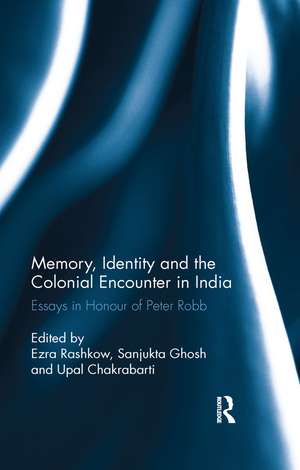Memory, Identity and the Colonial Encounter in India: Essays in Honour of Peter Robb
Editat de Ezra Rashkow, Sanjukta Ghosh, Upal Chakrabartien Limba Engleză Paperback – 28 mar 2019
By drawing on empirically rich, regional and chronological historical studies, this book will be essential reading for students and researchers of history, political science, colonial studies, cultural studies and South Asian studies.
| Toate formatele și edițiile | Preț | Express |
|---|---|---|
| Paperback (1) | 398.64 lei 6-8 săpt. | |
| Taylor & Francis – 28 mar 2019 | 398.64 lei 6-8 săpt. | |
| Hardback (1) | 1002.63 lei 6-8 săpt. | |
| Taylor & Francis – 22 aug 2017 | 1002.63 lei 6-8 săpt. |
Preț: 398.64 lei
Nou
Puncte Express: 598
Preț estimativ în valută:
76.30€ • 82.91$ • 64.14£
76.30€ • 82.91$ • 64.14£
Carte tipărită la comandă
Livrare economică 21 aprilie-05 mai
Preluare comenzi: 021 569.72.76
Specificații
ISBN-13: 9780367277888
ISBN-10: 0367277883
Pagini: 338
Dimensiuni: 138 x 216 x 23 mm
Greutate: 0.67 kg
Ediția:1
Editura: Taylor & Francis
Colecția Routledge India
Locul publicării:Oxford, United Kingdom
ISBN-10: 0367277883
Pagini: 338
Dimensiuni: 138 x 216 x 23 mm
Greutate: 0.67 kg
Ediția:1
Editura: Taylor & Francis
Colecția Routledge India
Locul publicării:Oxford, United Kingdom
Public țintă
PostgraduateCuprins
List of Illustrations. List of Contributors. Foreword by Clive Dewey. Acknowledgements. Introduction PART 1 Memory and Identity I Colonial Memory 1. Memory, Place and British Memorials in Early Calcutta: transcript of a lecture by Peter Robb II Colonial Identities 2. On the Political History of Britishness in India: Lord Cornwallis and the Early Demise of Creole India 3. Religion and Race: Eurasians in Colonial India III Textual Representations of Memory and Identity 4. Texts of Liminality: Reading Identity in Dalit Autobiographies from Bengal 5. Paradoxes of Victimhood: Dalit Women’s Bodies as Polluted and Suffering in Colonial North India IV Sites of Memory and Identity Formation 6. Sites of Memory and Structures of Power in North India: Anandamath and Hanumangarhi 7. Dispossessing Memory: Adivasi Oral Histories from the Margins of Pachmarhi Biosphere Reserve, Central India PART 2 Colonial Encounters I Encounters with Regional Governance 8. Heroinism and Its Weapons: Women Power Brokers in Early Modern Bhopal 9. Changing Horses: The Administration of Sikkim, 1888–1918 II Encounters with Surveillance and Resistance 10. Lost in Transit? Railway Crimes and the Regime of Control in Colonial India 11. From London to Calcutta: The ‘Bolshevik’ Outsider and Imperial Surveillance, 1917–1921 III Encounters and ‘Improvement’ 12. Competition or Collaboration? Importers of Salt, the East India Company, and the Salt Market in Eastern India, c. 1780–1836 13. Challenging the 3Rs: Kindergarten Experiments in Colonial Madras 14. Scientific Knowledge and Practices of Green Manuring in Bengal Presidency, 1905–1925 Appendix: Major Publications and Supervised These by Peter Robb. Index
Notă biografică
Ezra Rashkow is Assistant Professor in the Department of History at Montclair State University, USA.
Sanjukta Ghosh is Research Associate at the South Asia Institute, School of Oriental and African Studies (SOAS), University of London, UK.
Upal Chakrabarti is Assistant Professor of Sociology at Presidency University, Kolkata, West Bengal, India.
Sanjukta Ghosh is Research Associate at the South Asia Institute, School of Oriental and African Studies (SOAS), University of London, UK.
Upal Chakrabarti is Assistant Professor of Sociology at Presidency University, Kolkata, West Bengal, India.
Descriere
This book sheds new light on the dynamics of the colonial encounter between Britain and India. It highlights how various analytical approaches to this encounter can be creatively mobilised to re-think entanglements of memory and identity emerging from British rule in the subcontinent.
